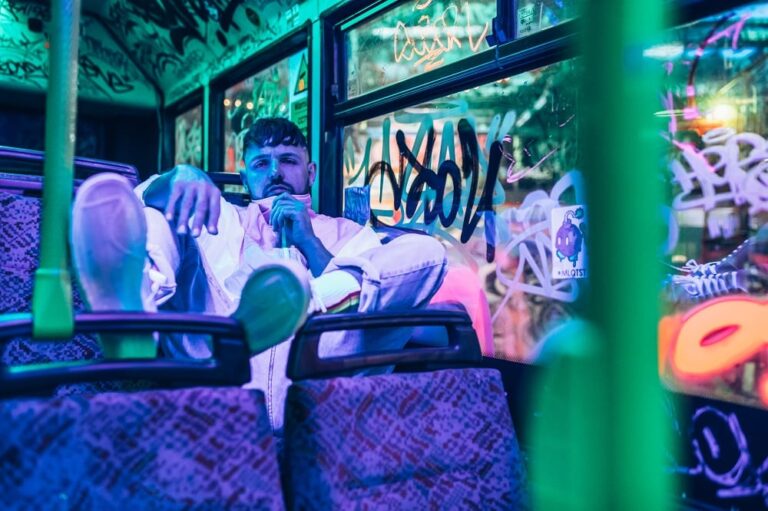“This time is so interesting. Touring producers and DJs are sat on so much more than they ever have been. Music could change. Genres or sub genres could be born.” – Macky Gee
Thinking back to our last club experiences can bring up a plethora of emotions. For me, it was experiencing Workforce on a 4am rollout session at E1 in January. Hazy memories of organ-rumbling bass and blistering drums, strobe lights momentarily illuminating the sweat-drenched faces of people you’ve never seen before, all united first and foremost by a shared love of this music.
Never in those moments did anyone picture what would happen next, nor even find a moment to take it for granted. However, humans are without doubt an adaptive species, whether our individual experiences over the last six months would lead us to believe that.
Livestreams came first, before new government rules and regulations led us into the at-first unfamiliar landscape of sit-down, socially distanced raving. Brands and labels like Engage Audio and Rebel Music have taken the reigns over at The Cause’s new venture Costa Del Tottenham, helping to settle some sense of normality back into our lives.
Nevertheless, beyond the more obvious effects on the wider raving community and the financially suffering music industry, what effect is it having on the creative processes of the artists themselves? Will we see our current no-clubbing landscape change the ways DJs and producers approach their art? What effect could that have on the very core sound of the genre? Catching up with Macky Gee, Workforce, Mitekiss, Kyrist, Philth, Serum & GLXY on the matter, there seem to be some common themes.
“There’s so much misinformation, shit information and conflicting information” says Workforce. “I’m not really sure what I’m supposed to be doing, and also to what end? I’m making music that’s going to be released next year probably, but what does next year look like? What’s the certainty that we go back to any sort of clubbing lifestyle again? There isn’t any certainty about that, so when I go into the studio and start making music, that becomes a consideration – well what’s the purpose of this? What am I trying to sustain here?”
At the centre of this whole discussion lies this overbearing sense of uncertainty, with a return to normality often feeling further away by the day. Speaking to Mitekiss about the effect on his own motivation, he explains:
“It’s more like, when you’re seeing the world collapse around you, do you really want to make music? It’s not an inspiring time to make music… Although in fact I’m sure it is for some people, maybe for lyricists and vocalists. There’s a lot of stuff to write about at the moment, but it’s hard to get the creativity going.”
Unlike many in his position, Goldfat head honcho Mitekiss does not DJ, and therefore does not rely on touring for income. He acknowledges this yet explains how lockdown has still allowed him more time to focus on new online projects.
In between his active Discord and Patreon, Mitekiss has been consistently holding weekly feedback sessions on Twitch in order to provide a place for newcomers to fortify their skills – even signing artists that have impressed him.
“I know how this scene can be very difficult to break into… Well I know from experience how hard it is. I just figure if I can help someone then that’s great because it can take ages to get somewhere.”
He’s not the only artist in his position to be thriving off helping others. As someone that has relied on a hectic touring schedule as part of her income, Kyrist found herself looking for other avenues, including music production sessions solely for women – an initiative vital in an undeniably male dominated scene.
“I’d like to continue doing that even when the gigs start to pick back up again” she states, “I think that’s really cool to be able to impart my knowledge onto other people.”
Philth equally gains energy off this, and in fact has for a while with his day job of one-to-one tuition. With the initial descent into a new furloughed UK, he found himself with more business than ever. Describing the lessons as a “positive feedback loop”, he is able to give helpful advice to new producers, whilst then being able to implement these techniques back into his own studio time.
It reminds him of the long game, he explains, “rather than the temporary problems we’re having at the moment.” The adjustment from a regularly functioning world to one at a complete standstill left us with no room to breathe and finding ways to cope with this on both an individual and collective level is often the only way forwards.
How does this scenario affect the actual creative and experimental processes of making music? It is no news that Serum recently reached number one across all genres on Beatport with the long-awaited club ripper Chop House. However, like many others he explains that he is exploring new avenues. “I’ve had time musically to experiment with sounds that aren’t necessarily as club based as what they were, more musical stuff.”
He explains that whilst he played a key part in the now saturated foghorn sound, he feels the need to diversify and find his “next thing”. “Somebody always has to lead from the front on any kind of change of sound. You’ll always piss a few people off and gain a few new ones.”
Grateful to have his label Souped Up under his belt in both a financial and creative sense, he looks to use it to deliver the stash of music he has been whittling away at over lockdown, as well as the multitude of dubs that circulated the clubs pre-COVID.
The idea of ‘road-testing’ music in a club has played a vital role in our culture since the emergence of the genre in the mid-to-late 90s, gauging the reaction of new tunes on a proper sound system and gathering hype. In the modern day, for tunes like Chop House, or even Workforce’s Your Moves, the success of the tunes can be supported by the viral videos from clubs and festivals, spread around Facebook ID groups and various online platforms many months before any official announcements.
Speaking to artists about the creative process of production pre-COVID, many of them would envision club spaces whilst putting tunes together. “I would always have a club in mind” explains Workforce, “while also making sure that anything I was making was still listenable at home.”
“I’d say since COVID I’ve been a bit less rigid in terms of the styles of stuff I’m making as you don’t have to think quite so much as things being as DJ friendly. There’s an element of that factoring in for me now which is actually quite freeing in a few ways.”
He goes on, “Where is the value in the stuff in between? The stuff that’s purely for DJs. I think the really simplistic drum and bass music probably isn’t going to work as well now, and I guess that’s one upside – that people will have to go in on all the details of what they’re doing now. There’s nowhere to hide it.”
Philth takes a somewhat different angle, believing that ravers are wanting a return to normality in any way possible. Speaking about his recent sets at Engage Audio’s socially distanced raves at Costa Del Tottenham, he says:
“I’m approaching these events as an opportunity to play the newest music that I have, and music that is intended to be played in clubs even if it’s not 3am on a packed-out dancefloor. The people there still want to get a feel of that real true club music experience.”
Moving onto the production side of the conversation, he explains how he has reset his relationship with the studio. “I needed the reminder that I make music because I love making music, not just because people buy it or because people pay to see me DJ it.”
One genre of music he’s been revisiting heavily during lockdown is hip-hop, even hinting at the possibility of a full album next year complete with a bunch of familiar vocalists. Incorporating production techniques associated with the genre such as MPC-style sampling has led to him feeding these techniques back into his more soulful drum and bass tunes, as well as injecting enjoyment back into studio time.
A sense of clarity is apparent for many, with Kyrist being another producer switching up the creative process. “I’ve started to use Ableton after using Logic for about 10 years which is different. Learning a new DAW has opened my eyes a little bit to being way more creative, especially using plugins that I don’t know what they do fully… I’m a lot more experimental. I’m going outside of my little comfort zone.”
Macky Gee is similarly whipping up fresh new sounds in the studio, despite his output already being far more diverse than many surface listeners may be led to believe. His fifth studio album It’s A Gee Thing was released during lockdown in May and featured a colossal 28 tracks that touched on far more than just drum and bass.
“I enjoy making all types of music” he explains. ‘I don’t feel so much pressure on having to make fresh music for shows week in and week out as such. I’m writing experimental things now.”
He also enthusiastically states his disinterest of social media during the lockdown period and beyond. “I’ve spent time around people who matter and am appreciating life a lot more in these mad times. All that social media shit ain’t good for anyone’s health if you feel yourself going down a negative road.” Tensions are at an all-time high on social media, and it can be difficult to find that balance.
Unlike Macky Gee, Serum takes more of an active role in social media, using it to interact with fans yet being cautious not to get too stuck in. “It’s just like, what is going to happen next week?” he laughs. “Who’s next to either have a public meltdown and destroy their career or which race is going to be in the firing line from somebody?”
“I’m finding you’ve got to cope with people you respect having very very different opinions to your own,” he continues. “How do you deal with that and it not get ugly? That’s the long and short of it, and it’s really not easy. I know what I think, but who knows who’s right? It’s pretty tough. There’s been some very hard times for me and for people I know.”
For many, it’s about spinning negatives into something positive. GLXY explain how lockdown took a big hit on them creatively for the most part, with a solid two to three months of no tunes being made. However, in June they teamed up with Degs to create the incredible, thought provoking Young Hearts, an impactful charity tune that acted a reaction to the sorrow and tragedy forming the basis of the BLM movement.
“We basically wrote the tune in about five days from the initial idea”, Jon GLXY explains. “Two days before the release Nu:Tone mastered the track for free and then Hospital got the lyric video put together literally a day before release. The whole thing was mad.”
Tom GLXY goes on to say, “If it wasn’t lockdown and the music industry was running at 100 miles an hour like it usually would, that track probably wouldn’t have come together.” Once again, it acts as an example of artists reaching outside of their comfort zone in order to find something positive in times of crisis.
It is a form of creativity that feels completely genuine, experimentation free from the shackles of genre norms and ideals. Philth sums it up nicely, perusing the vision that maybe artists will write more “honest” music, “where people write what they want to write.”
“At the moment I’m just waiting for this lockdown to finish to see what everyone’s been up to.” – Macky Gee
Times are still tough for everyone. As the uncertainty around our beloved nightlife grows stronger, and as we find other ways to scratch the itch, we find ourselves in a sort of limbo. Upon writing this article, more government curveballs are thrown into the mix and messages feel more misconstrued and contradictory than ever.
It is important to note here that individual situations play a key role in this sphere of music making. Financial difficulties caused directly by the sudden shutting down of clubs and the lack of support from the government can affect everything from the mental health, motivation and time restraints on artists. However, with the drum and bass community being as tenacious as ever, the benefits are being reaped wherever possible.
Artists are being forced to push themselves creatively, some of them renewing their musical identities in order to adapt to a constantly fluctuating environment. Whilst making any real judgement as to where the genre is heading in its sonics would be purely guesswork, it certainly doesn’t feel outlandish to suggest that change is in the pipeline.
For now, all anyone can do is stay patient, be sensible, and show the music industry support wherever possible, in any way, shape or form.
“I think in another six months time, we’re going to start to really see what people have been doing and spreading their wings.” – Philth


